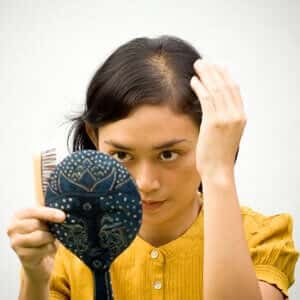
Don’t you just love medical terminology? Hair pulling is straightforward. You immediately understand what it means. But no, doctors have to use Greek or Latin. You get the tongue twister trichotillomania because the Greek word for hair is thrix. The Greek word to pull is tillein and the Greek for madness is mania. The French dermatologist Francois Henri Hallopeau put them all together in 1889 to describe compulsive hair pulling and voila: trichotillomania. We prefer to shorten that to trich.
It is estimated that 4% of the people in the United States suffer from obsessive hair pulling. That’s according to researchers writing in Seminars in Cutaneous Medicine and Surgery (June, 2013). If you do the math, that translates into more than 13 million Americans dealing with trichotillomania. Adolescents are most susceptible to trich, but adults can also be affected by the urge to pull hair from the scalp, eyebrows, eyelashes, beard, mustache or even the genital area. Will a drug like naltrexone overcome obsessions like trich? This reader says it just might help.
Using Naltrexone to Overcome Obsessions:
Q. I use naltrexone off label to help me control trichotillomania [hair pulling]. It has been a godsend and helped me more than I ever thought possible. I’ve struggled with the disorder for almost 40 years and naltrexone has been the most helpful.
A. Trichotillomania involves compulsively pulling out hair from the scalp, eyebrows or other parts of the body. It can be quite challenging to treat.
The FDA has not approved any medications for this condition. Cognitive behavioral therapy (CBT) may be effective.
NAC and Inositol for Trichotillomania?
Dietary supplements such as NAC (N-acetylcysteine) and Inositol may also be helpful (Archives of General Psychiatry, July, 2009).
The authors of this study summarized their results:
“Fifty-six percent of patients “much or very much improved” with N-acetylcysteine use compared with 16% taking placebo (P = .003). Significant improvement was initially noted after 9 weeks of treatment.
CONCLUSIONS:
“This study, the first to our knowledge that examines the efficacy of a glutamatergic agent in the treatment of trichotillomania, found that N-acetylcysteine demonstrated statistically significant reductions in trichotillomania symptoms. No adverse events occurred in the N-acetylcysteine group, and N-acetylcysteine was well tolerated. Pharmacologic modulation of the glutamate system may prove to be useful in the control of a range of compulsive behaviors.”
NAC can be purchased over the counter in health food stores or pharmacies.
Another dietary supplement, inositol, may also be beneficial. This natural substance is found in plants and people. It has been used for obsessive-compulsive disorder. One study published in the journal International Clinical Psychopharmacology (March, 2017) suggested some modest benefit from inositol. NAC seems more effective, however.
Will Naltrexone Overcome Obsessions?
Naltrexone is approved for treating addictions such as alcoholism. Some research supports the use of naltrexone to treat conditions such as compulsive hair pulling, shop lifting and other behavioral addictions (European Addiction Research, online, Sept. 7, 2017). A somewhat similar condition, skin picking, may benefit from a combination of treatments.
An article in the American Journal of Psychiatry (Nov. 2012) offered this advice:
“Clinical evaluation of patients with skin picking disorder entails a broad physical and psychiatric examination, encouraging an interdisciplinary approach to evaluation and treatment. Approaches to treatment should include cognitive-behavioral therapy (including habit reversal or acceptance-enhanced behavior therapy) and medication (serotonin reuptake inhibitors, N-acetylcysteine, or naltrexone).”
Naltrexone and Alcohol:
The FDA has approved the use of naltrexone for people trying to give up alcohol.
Megan shares her experience with naltrexone:
“For me, the key has been to use the Naltrexone along with cognitive therapy and meditation for my anxiety. I also had to cut the doses in half because the full dose makes me sick (nausea, dizziness). Based on my experience I’d recommend naltrexone to anyone who is looking for a solution to end their drinking problem. Search for another doctor if your present doctor will not prescribe it to you. Most doctors have not even read the research behind this drug and are in the dark regarding naltrexone.”
Share Your Story:
If you have had an experience with trichotillomania, please share your story below in the comment section. Have you discovered something that worked? We would love to hear from you.

